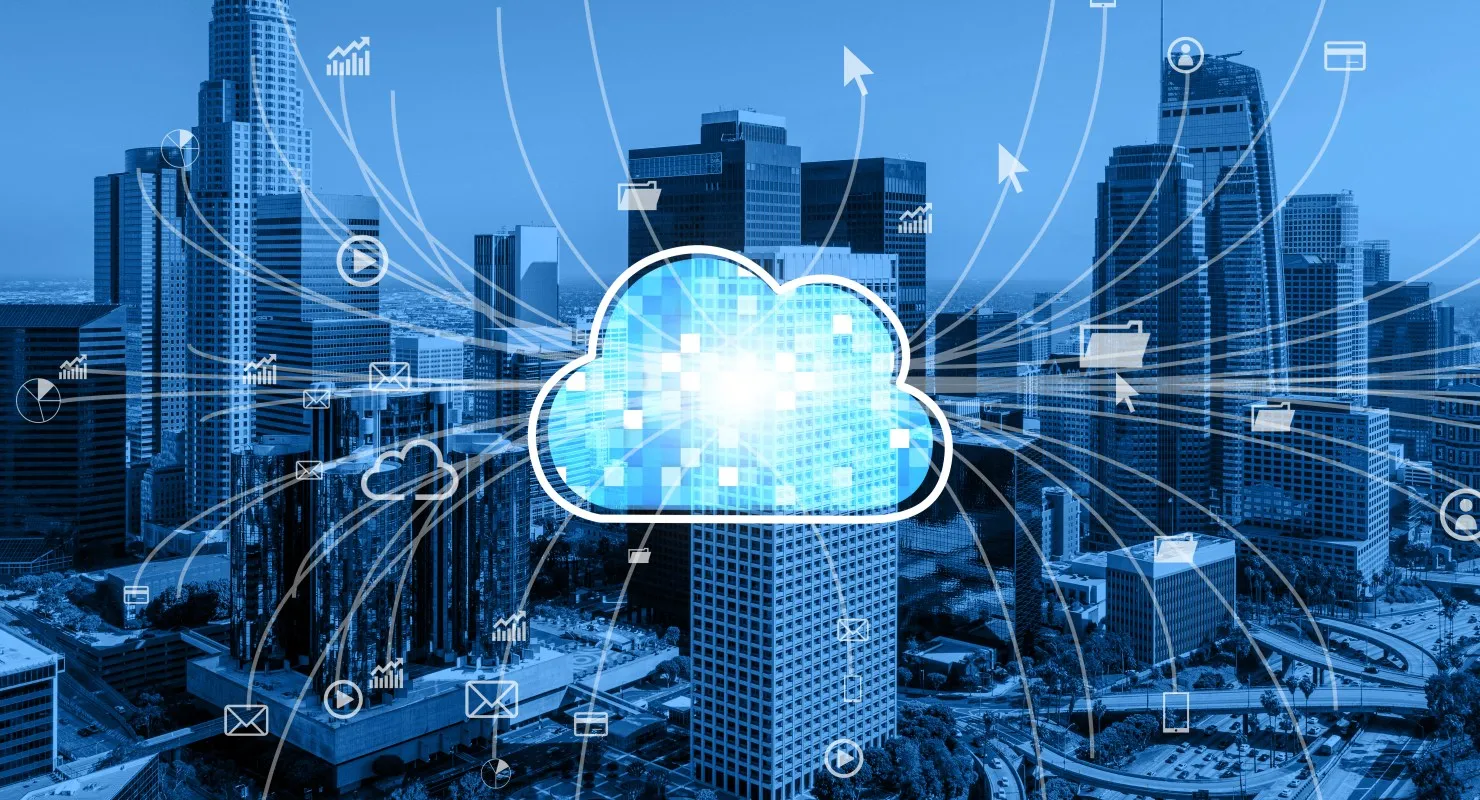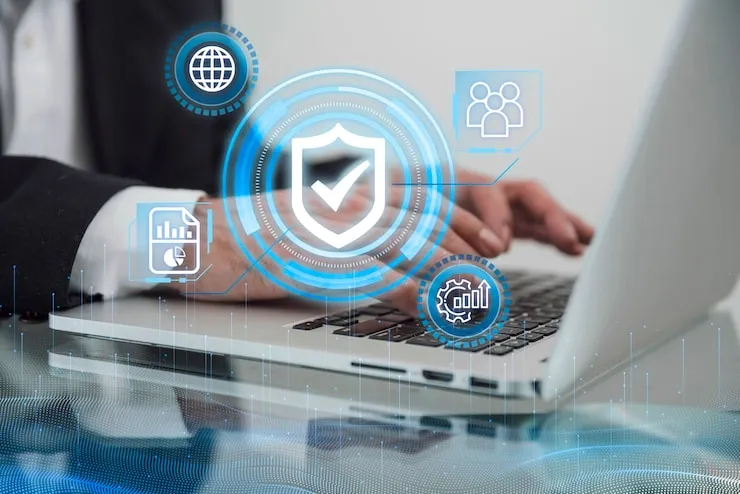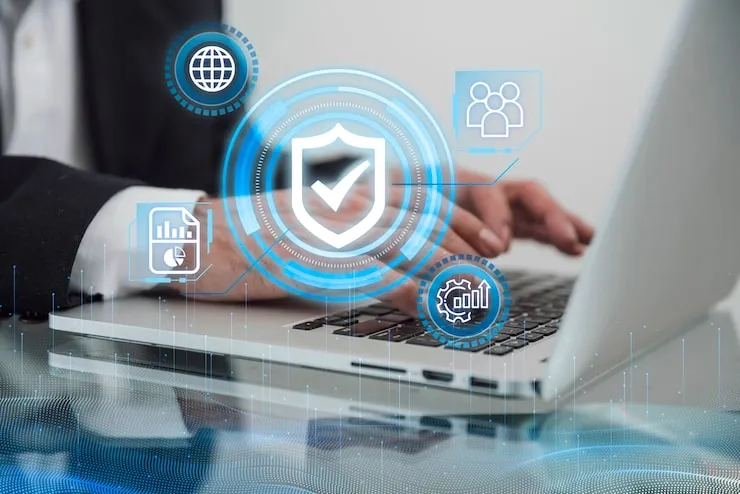I remember the first time someone explained cloud computing to me. They said, "It's like having a magical computer that lives in the sky!" While that made me chuckle, it wasn't far from the truth. Today, I use cloud services every single day, and I bet you do too – even if you don't realize it yet. What is cloud computing with example? Simply put, it's using computers, storage, and software over the internet instead of on your own device. When you check your Gmail, stream Netflix, or save photos to Google Drive, you're using the cloud! In this guide, I'll walk you through everything you need to know about cloud computing. We'll explore different types, see real life examples of cloud computing, and discover how this amazing technology makes our lives easier every day.
What Is Cloud Computing? Breaking It Down Simply
Let me explain cloud computing in the simplest way possible. Imagine you want to watch a movie. Years ago, you had to buy a DVD and play it on your home player. Now, you just open Netflix on any device and start watching. That's cloud computing in action! Cloud computing means using computer services through the internet. Instead of storing everything on your phone or laptop, you store it "in the cloud" – which is really just other people's computers in special buildings called data centers.
Here's what makes cloud computing so special:
- You can access your stuff from anywhere with internet
- You don't need to buy expensive equipment
- Someone else takes care of all the technical problems
- You only pay for what you actually use
I've been using cloud services for over a decade, and I can tell you it's changed everything about how we work and play online.
The Three Main Types Of Cloud Computing With Real-life Examples
Public Cloud Computing: The Shared Playground
Public cloud is like a huge playground that everyone can use. Big companies like Amazon, Google, and Microsoft build these massive computer systems and let us all share them.
Real-world examples I use daily:
- Gmail for my email
- Google Drive to store my documents
- Netflix for entertainment
- Spotify for music streaming
The best part about public cloud? It's usually free or very cheap to start using. I remember when I first moved all my photos to Google Photos – suddenly I had space on my phone again!
Benefits of public cloud:
- Super affordable (often free!)
- No setup required
- Available everywhere
- Always updated with new features
Private Cloud Computing: Your Personal Digital Space
Think of private cloud like having your own personal library. Only you (or your company) can use it. Many big businesses use private clouds to keep their secret information safe.
Examples of private cloud computing:
- Company email systems that only employees can access
- Hospital patient records that must stay private
- Bank systems that handle your money
- Government databases with sensitive information
I've worked with companies that use private clouds, and the main reason is security. They want complete control over who sees their data.
Why choose private cloud:
- Maximum security and privacy
- Full control over everything
- Can be customized exactly how you want
- Follows strict rules and regulations
Hybrid Cloud Computing: Best of Both Worlds
Hybrid cloud is like having both a public library and a private study room. You use the public space for everyday things and the private room for important work.
Real hybrid cloud examples:
- Businesses that keep customer data private but use public cloud for their website
- Schools that store grades privately but use Google Classroom for assignments
- Hospitals that keep patient records secure but use public cloud for scheduling
- Online stores that use private systems for payments but public cloud for product photos
This mixed approach gives you flexibility. I've seen companies save tons of money by using hybrid clouds smartly.
Cloud Service Models: How You Actually Use the Cloud
Software as a Service (SaaS): Ready-to-Use Applications
SaaS is like going to a restaurant where everything is already cooked and ready to eat. You just sit down and enjoy!
10 examples of cloud computing SaaS I use:
- Microsoft Office 365 for documents and presentations
- Salesforce for managing customer relationships
- Slack for team communication
- Zoom for video meetings
- Dropbox for file sharing
- Adobe Creative Cloud for design work
- QuickBooks Online for accounting
- Mailchimp for email marketing
- Canva for creating graphics
- Trello for project management
The beauty of SaaS is simplicity. I don't need to install anything or worry about updates – everything just works!
Platform as a Service (PaaS): Building Your Own Apps
PaaS is like having a fully equipped kitchen where you can cook whatever you want. All the tools are there; you just need to bring your recipe (code).
PaaS examples developers love:
- Google App Engine for building web applications
- Microsoft Azure for creating business solutions
- Heroku for deploying websites quickly
- AWS Lambda for running code without servers
As someone who's built websites, PaaS saves incredible amounts of time. Instead of setting up servers and databases, I can focus on creating cool features.
Infrastructure as a Service (IaaS): Raw Computing Power
IaaS is like renting a powerful computer that lives far away but works like it's right next to you. You get all the computing power without buying the actual machine.
IaaS examples in action:
- Amazon Web Services (AWS) for virtual servers
- Google Cloud Platform for storage and computing
- Microsoft Azure for enterprise solutions
- Digital Ocean for developer-friendly hosting
I use IaaS when I need more power than my laptop can provide, especially for big projects or testing new ideas.
Real Life Examples of Cloud Computing You Use Every Day
Entertainment and Media
Streaming services have completely changed how we consume entertainment. I remember burning CDs and buying DVDs – now everything streams instantly!
Popular entertainment cloud services:
- Netflix streams movies and shows to millions simultaneously
- YouTube hosts billions of videos accessible worldwide
- Spotify gives us unlimited music libraries
- Disney+ delivers high-quality content on demand
- Twitch lets gamers stream live to global audiences
Communication and Social Media
Social media platforms are massive cloud computing examples. Every time you post a photo or send a message, you're using powerful cloud systems.
Communication cloud examples:
- WhatsApp handles billions of messages daily
- Facebook stores photos and posts from users worldwide
- Instagram processes millions of photos and videos
- Twitter delivers real-time updates globally
- LinkedIn connects professionals across the globe
Business and Productivity
Cloud-based business tools have revolutionized how we work. I can start a document on my laptop and finish it on my phone seamlessly.
Business productivity examples:
- Google Workspace (formerly G Suite) for collaboration
- Microsoft 365 for office productivity
- Slack for team communication
- Asana for project management
- Zoom for video conferencing
Shopping and E-commerce
Online shopping wouldn't exist without cloud computing. Every time you buy something online, multiple cloud services work together to process your order.
E-commerce cloud examples:
- Amazon handles millions of transactions daily
- eBay connects buyers and sellers globally
- Shopify powers thousands of online stores
- PayPal processes secure payments
- Etsy hosts creative marketplace transactions
Benefits of Cloud Computing: Why I'm a True Believer
Cost Savings That Actually Matter
Cloud computing has saved me thousands of dollars over the years. Instead of buying expensive software licenses, I pay small monthly fees. Instead of purchasing powerful computers, I rent computing power when needed.
Money-saving examples:
- No upfront hardware costs – start using services immediately
- Pay-as-you-go pricing – only pay for what you actually use
- Reduced IT maintenance – someone else handles technical problems
- Automatic updates – always get the latest features without extra cost
Flexibility and Scalability
The flexibility of cloud computing amazes me daily. During busy periods, I can instantly access more resources. When things slow down, I scale back and save money.
Flexibility benefits:
- Access from anywhere with internet connection
- Work on any device – phone, tablet, laptop, or desktop
- Instant resource scaling up or down as needed
- Global accessibility for teams spread worldwide
Enhanced Security and Reliability
Contrary to what some people think, cloud computing is often more secure than traditional methods. Major cloud providers invest millions in security measures I could never afford personally.
Security advantages:
- Professional security teams monitor systems 24/7
- Regular security updates happen automatically
- Data backup and recovery protects against loss
- Compliance certifications meet industry standards
Challenges and Considerations
Internet Dependency
The biggest drawback I've experienced with cloud computing is internet dependency. When my connection goes down, I can't access cloud-based tools.
Connectivity challenges:
- Slow internet can make cloud apps frustrating
- No offline access for purely cloud-based services
- Data usage concerns for mobile connections
- Remote area limitations where internet is unreliable
Privacy and Data Control
Storing data in the cloud means trusting someone else with your information. While major providers are generally trustworthy, it's important to understand what you're agreeing to.
Privacy considerations:
- Read terms of service carefully
- Understand data location and applicable laws
- Review privacy policies regularly
- Consider data sensitivity before cloud storage
The Future of Cloud Computing: What's Coming Next
Edge Computing Revolution
Edge computing brings cloud services closer to where they're needed. Instead of data traveling to distant servers, processing happens nearby for faster responses.
Edge computing examples:
- Smart traffic lights that respond instantly to conditions
- Autonomous vehicles that need split-second decision making
- IoT devices that process data locally
- Augmented reality applications requiring immediate responses
Artificial Intelligence Integration
AI-powered cloud services are becoming more common and accessible. I'm already using AI features built into cloud applications for writing, photo editing, and data analysis.
AI cloud integration:
- Smart photo organization in cloud storage
- Predictive text in cloud-based writing tools
- Automated customer service in business applications
- Intelligent data analysis for decision making
Server less Computing Growth
Server less computing lets developers run code without managing servers. It's like having a magical computer that only exists when you need it and disappears when you're done.
Server less benefits:
- Zero server management required
- Perfect scaling – handles any amount of traffic
- Pay per execution – extremely cost-effective
- Focus on code instead of infrastructure
Choosing the Right Cloud Solution for Your Needs
For Personal Use
If you're just getting started with cloud computing, I recommend beginning with free services and gradually exploring paid options as your needs grow.
Best personal cloud choices:
- Google Drive for document storage and collaboration
- iCloud if you use Apple devices exclusively
- Dropbox for simple file sharing
- OneDrive if you use Microsoft products
For Small Businesses
Small businesses can leverage cloud computing to compete with larger companies without massive IT investments.
Small business recommendations:
- Google Workspace for email and productivity
- QuickBooks Online for accounting
- Slack for team communication
- Shopify for e-commerce
For Large Enterprises
Big companies need more sophisticated cloud solutions with advanced security, compliance, and customization options.
Enterprise cloud strategies:
- Hybrid cloud for balanced security and flexibility
- Multi-cloud approaches to avoid vendor lock-in
- Private cloud for sensitive data and applications
- Professional cloud consulting for complex implementations
Getting Started: Your Cloud Computing Journey
Step 1: Assess Your Current Needs
Before diving into cloud computing, take inventory of what you currently do with technology. What problems are you trying to solve? What improvements do you want to make?
Questions to consider:
- What software do you use regularly?
- How much data do you need to store?
- Do you need to collaborate with others?
- What's your budget for technology services?
Step 2: Start Small and Experiment
I always recommend starting with free cloud services to get comfortable with the concept. Most major providers offer generous free tiers that let you explore without financial commitment.
Beginner-friendly starting points:
- Create a Google account and try Google Drive
- Sign up for Microsoft 365 free trial
- Explore Amazon Web Services free tier
- Try Dropbox for file storage
Step 3: Gradually Expand Your Usage
As you become more comfortable with cloud services, gradually move more of your activities to the cloud. This measured approach helps you adapt without overwhelming yourself.
Expansion strategies:
- Move email to cloud-based services
- Store files in cloud storage
- Use cloud-based productivity tools
- Explore industry-specific cloud applications
Conclusion: Embracing the Cloud-First Future
Cloud computing has fundamentally changed how we interact with technology, and I believe we're still in the early stages of this transformation. From the simple act of checking email to running complex business operations, cloud services have become integral to our daily lives. The types of cloud computing with real-life examples we've explored demonstrate the incredible versatility and power of this technology. Whether you choose public, private, or hybrid cloud solutions, the benefits of increased flexibility, reduced costs, and enhanced capabilities are undeniable.
Real life examples of cloud computing surround us everywhere – from streaming our favorite shows to collaborating on work projects with colleagues across the globe. The 10 examples of cloud computing services I mentioned are just the tip of the iceberg in terms of what's possible. As we look toward the future, cloud computing will continue evolving with emerging technologies like artificial intelligence, edge computing, and server less architectures. The key is to start where you are, experiment with different services, and gradually build your cloud expertise.
Remember, you don't need to be a technical expert to benefit from cloud computing. Start with simple services that solve real problems in your life or work, and expand from there. The cloud is not just the future of computing – it's the present, and it's waiting for you to explore its possibilities. Whether you're an individual looking to simplify your digital life or a business seeking competitive advantages, cloud computing offers solutions that were unimaginable just a few years ago. Take that first step into the cloud – I promise you won't look back.













